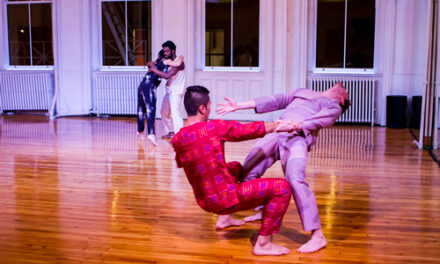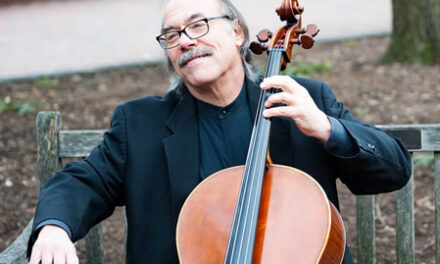 The dramatic album cover of jazz drummer Max Roach‘s 1960 “We Insist! Freedom Now Suite” shows three men at a lunch counter, heads turned over their shoulders, staring directly at the viewer. The photo, as well as the album, was inspired by the Greensboro sit-ins which began on Feb. 1 of the same year, in which four students from NC A&T University refused to leave a Woolworth’s “whites only” lunch counter. The album, which was co-written by Oscar Brown Jr. and featured vocalist Abbey Lincoln and saxophonist Coleman Hawkins, among others, became and remained perhaps the most famous explicitly political jazz album ever. Made up of five movements, the album explores African American history through slavery and Emancipation to the Civil Rights Movement. With eerie, dissonant sounds and even moments of outright screaming by Lincoln, the album expressed the rage and despair, as well as moments of hope, of this time infected by Jim Crow and apartheid, though inspired by the courage of martyrs.
The dramatic album cover of jazz drummer Max Roach‘s 1960 “We Insist! Freedom Now Suite” shows three men at a lunch counter, heads turned over their shoulders, staring directly at the viewer. The photo, as well as the album, was inspired by the Greensboro sit-ins which began on Feb. 1 of the same year, in which four students from NC A&T University refused to leave a Woolworth’s “whites only” lunch counter. The album, which was co-written by Oscar Brown Jr. and featured vocalist Abbey Lincoln and saxophonist Coleman Hawkins, among others, became and remained perhaps the most famous explicitly political jazz album ever. Made up of five movements, the album explores African American history through slavery and Emancipation to the Civil Rights Movement. With eerie, dissonant sounds and even moments of outright screaming by Lincoln, the album expressed the rage and despair, as well as moments of hope, of this time infected by Jim Crow and apartheid, though inspired by the courage of martyrs.
That, of course, was 60 years ago. This past October, JazzArts Charlotte recreated the Freedom Now Suite for the album’s anniversary in a live, outdoor performance that was video recorded. (The video is to be released February 11th for a limited in-person screening and Feb. 12th for the general public through JazzArts’s social media platforms). That week in October was also the same in which one of my friends, a student at UNC-Asheville, rushed home to Charlotte after her school was threatened by white supremacists and went on lockdown; the date of the video release will reflect just one month and several days since white supremacist rioters stormed the U.S capitol. Thus, with a full band which included a rhythm section, three horns (including guest trumpeter from New York City, Sean Jones), and four percussionists, paired with a vocalist, and dancers from Charlotte dance company Moving Spirits, JazzArts demonstrated that “We Insist!,” though historic, is hardly an album of the past.
It was quite a picture: The musicians dressed handsomely in black suits and ties were set up across portable stages; cymbals and horns glistened under streetlights. The concert was held downtown on Charlotte’s Black Lives Matter street mural, which was painted in June in support of the growing movement. The dancers, dressed in all white, danced in front of the musicians for several movements, feet gliding and stamping, revitalizing the bold letters which had begun to fade.
The suite was prefaced by a spoken word recited by well-known local poet Quentin Talley, and then began with the album’s opening piece, “Driva’ Man,” a haunting blues about a slave driver. Vocalist Dawn Anthony, with a rich voice both beautiful and unsettling, opened as Lincoln does in the original: acapella, while shaking and clapping a tambourine. The tune is in 5/4, a time signature that, marked by the clap – a whip which continues to strike on the downbeat — is disconcerting; it never feels like you can finish a thought before the clap comes back in, pushing the music, the singer, and the listener on.
In the following piece, “Freedom Day,” Emancipation is depicted with an up-tempo swing and lyrics that both celebrate and question the idea of freedom. Anthony sang accompanied by the powerful band, led on drums by artistic director of JazzArts Charlotte Ocie Davis. Davis, who has toured with the likes of world-class trumpet player Nicholas Payton and the late Ellis Marsalis, was a particular stand-out, especially on this piece where his articulate and powerful solo became so intense, two of his cymbals literally flew off of their stands (this part may or may not be included in the final video release).
Davis and Anthony are featured in the third piece, “Triptych: Prayer / Protest / Peace,” which is a duet between drums and vocals. Davis began softly with crescendo-ing rolls on low toms; Anthony entered humming. Where Lincoln shrieked in fury in the original, Anthony more cried in exhaustion, perhaps to demonstrate this same voice of the ‘dreamer deferred’ that has been screaming constantly for 60 years and more.
The final two pieces, “All Africa” and “Tears for Johannesburg” (which laments the violent backlash towards anti-apartheid protesters in South Africa at the time), provided opportunities for the ensemble of percussionists to shine, as well as to feature the trio of Moving Spirits, which is a contemporary dance company led by UNC-Charlotte professor Tamara Williams and focuses on movement forms of the African diaspora. Though the event was unpublicized, by the end of the concert, a fairly large audience had formed of people who had come out specifically for this occasion, as well as those who had happened upon it spontaneously while walking downtown.
The audience was moved – literally and figuratively — as we stood distanced, masked, yet together, and I expect those who watch the video will be, too. There were moments that became difficult to hear – the sounds of car horns and of the street could sometimes dampen the voices of the musicians – but this shouldn’t appear in the video, and even if so, the addition of the street sounds only added to the symbolism of the music taking to the streets. Roach said in a 1970s interview that “the artist is like a secretary… He keeps a record of his time, so to speak.” JazzArts, through an invocation of Roach’s past record, documented our own, and not only that, but inspired people to listen and be aware so that 60 years from now, the anniversary performance can perhaps change the title of the suite from “We Insist!” to “We Insisted!,” and the voice in “Triptych” will have moved from a scream to a cry to finally, an exultation.
The original may be heard on YouTube, here.
Then, tune into the JazzArts Charlotte’s website, Facebook, or YouTube at 8pm for the Feb. 12th premiere.












